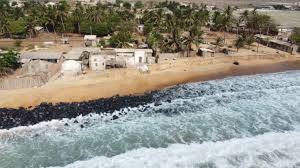The Devastating Impact of Coastal Erosion in Agavedzi, Ghana: A Call for Urgent Action
Introduction Coastal erosion is a growing environmental crisis in Ghana, with communities like Agavedzi experiencing severe consequences. Rising sea levels, powerful tidal waves, and climate change have intensified the situation, leaving thousands displaced and their livelihoods in jeopardy. Despite repeated pleas from affected residents, urgent government intervention is still lacking. This article explores the impact of coastal erosion in Agavedzi, its underlying causes, and potential solutions.
Understanding Coastal Erosion in Agavedzi Agavedzi, a coastal town in Ghana’s Volta Region, has been at the receiving end of unrelenting sea waves that have gradually swallowed homes, farmlands, and roads. Coastal erosion is the process where ocean currents, waves, and tides gradually wear away the shoreline. This phenomenon is worsened by human activities such as sand mining, deforestation, and poorly planned coastal infrastructure projects.
According to environmental reports, Ghana loses approximately 2 meters of its coastline every year due to erosion. However, in Agavedzi, the damage has been more severe. Residents have watched helplessly as their houses collapse into the ocean, forcing them to relocate without any substantial government support.
The Human Cost: Displacement and Economic Hardship The most immediate consequence of coastal erosion is displacement. Families who have lived in Agavedzi for generations now find themselves homeless, struggling to find shelter. Many have moved further inland, but with limited resources, they are forced to live in makeshift structures without proper sanitation or clean water. This has led to a surge in health issues, including waterborne diseases and respiratory infections.
Moreover, coastal erosion has significantly impacted the local economy. Fishing, the primary livelihood of Agavedzi’s residents, has suffered due to the destruction of landing sites and fishing infrastructure. Fishermen are unable to dock their boats safely, and the dwindling fish stock caused by environmental disruptions has worsened the situation. Additionally, salt production, another key economic activity in the region, has been affected by saltwater intrusion into evaporation ponds, making it difficult to sustain production.
Climate Change: A Major Driver of Coastal Erosion The worsening coastal erosion in Agavedzi is closely linked to global climate change. Rising sea levels, triggered by the melting of polar ice caps, have led to stronger tidal waves and unpredictable weather patterns. Scientists have warned that if greenhouse gas emissions continue at their current pace, more coastal towns in Ghana will face similar devastation.
Additionally, deforestation along the coastline has eliminated natural buffers like mangrove forests, which play a crucial role in preventing erosion. Without these protective barriers, the force of the waves directly impacts settlements, accelerating the rate of land loss.
The Role of Government and the Need for Immediate Action Despite the evident destruction, the response from authorities has been slow. Agavedzi residents have made numerous appeals for sea defense walls and relocation support, but efforts remain minimal. The government has initiated some projects to mitigate the damage in parts of the Volta Region, but these interventions have yet to reach Agavedzi.
To combat the crisis effectively, the government must prioritize the construction of sea defense walls, which have proven successful in other parts of the country. Additionally, implementing strict regulations on sand mining and promoting afforestation programs along the coast can help reduce the rate of erosion.
Community-Led Initiatives and Sustainable Solutions While government intervention is crucial, community-led initiatives can also play a significant role in mitigating coastal erosion. Local organizations and environmental groups have started educational programs to raise awareness about the dangers of sand mining and deforestation.
One promising solution is the replanting of mangroves and other vegetation along the coastline. These plants act as natural barriers, reducing wave intensity before they reach human settlements. Coastal communities in other parts of the world have successfully adopted this strategy, and with proper support, Agavedzi can benefit as well.
Additionally, promoting alternative livelihood programs can help affected residents transition to other income-generating activities. Training fishermen in sustainable aquaculture practices or providing resources for inland farming could offer long-term economic stability.
Conclusion The situation in Agavedzi highlights the urgent need for sustainable interventions to combat coastal erosion in Ghana. With climate change accelerating the crisis, both the government and local communities must work together to implement long-term solutions. By investing in sea defense projects, enforcing environmental regulations, and promoting community-led initiatives, we can protect coastal towns from further devastation.
The time for action is now. If left unchecked, the fate of Agavedzi could soon become the reality for many other coastal communities in Ghana. Stakeholders must prioritize this crisis before it escalates into an irreversible catastrophe.


